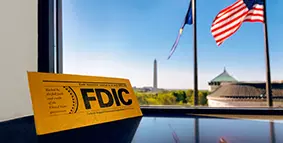
What to consider about using a nonbank
When considering where to hold their money, consumers have traditionally opened deposit accounts directly with banks (whether in-person, online, or through the bank’s mobile app). The easiest way for most consumers to have confidence that their money is safe continues to be depositing it in insured bank accounts. A newer option is for consumers to open accounts with nonbank companies (typically just online or through apps) that may or may not have a relationship with a bank. However, if and how a bank is involved is key for deposit insurance purposes.
In some cases, it is not always clear to consumers if they are dealing directly with an FDIC-insured bank or with a nonbank company. In addition, consumers need to be wary of fake bank websites and apps that may be scams. As a result, it is increasingly important to understand and trust who you are dealing with before turning over your money.
FDIC deposit insurance coverage
If you open a deposit account directly with an FDIC-insured bank, you are insured for at least $250,000 by the FDIC, which is backed by the full faith and credit of the United States government.
But what if you open an account with a nonbank company that says it will deposit your money in an FDIC-insured bank? Will you be eligible for FDIC deposit insurance coverage? The short answer is: it depends. If the nonbank company deposited your funds in a bank, then, in the unlikely event of the bank’s failure, you may be eligible for what is referred to as “pass-through” FDIC-deposit insurance coverage. However, the nonbank company has to take certain actions for your funds to be protected.
For example, after placing your funds on deposit at a bank, the nonbank company would have to keep records to identify who owns the money and the specific amount that each person owns. Ownership of the money is important and is typically determined by the applicable deposit account agreements and state law. There are other requirements as well. Because it is generally up to the nonbank company to satisfy the FDIC’s requirements for pass-through deposit insurance coverage, it is important to make sure you read the disclosures carefully to understand if the account may be eligible for FDIC insurance and that you can trust the nonbank company you are doing business with.
In addition, remember that FDIC deposit insurance does not apply if a nonbank company fails or files for bankruptcy. In that situation, it is possible that you may be able to recover your funds through a bankruptcy proceeding. However, in such cases, a bankruptcy court handles the proceedings, and it may take a significant amount of time for creditors (which would include you) to recover any money. As a result, you may want to be particularly careful with money that you rely on to meet your regular living expenses.
How can I avoid fake banks and apps?
You should be aware of the potential for scams and be vigilant about protecting your money. Scammers often create fake websites that are so similar to bank websites, they can easily trick consumers into providing personal information or money. To determine whether you are dealing with an FDIC-insured bank and check whether the URL is in the FDIC’s records, you can use our BankFind tool. Because many FDIC-insured banks have provided URLs for their websites, if a website is listed in the FDIC’s records then you can be more confident that it is run by a bank. You can also contact the FDIC at 877-ASK-FDIC (877-275-3342) from 8:00 am to 6:00 pm ET Monday through Friday, or 8:00 am to 1:00 pm ET Saturday, to report a suspected scam.
In addition, as an alternative, you can call an FDIC deposit insurance expert at 1-877-ASK-FDIC or email the FDIC through our website, ask.fdic.gov. FDIC deposit insurance experts are happy to help confirm whether or not you are dealing with an FDIC-insured bank and assist you with any deposit insurance related questions.
Scammers have also developed fake apps that contain malware. When you download the app, the malware steals personal information from your device or locks it, holding it for ransom until you pay the scammers. Other types of fraudulent apps ask you to login using your social media or email accounts that could expose your personal information for the scammers to steal.
Be careful of apps or websites that ask for suspicious permissions, such as granting access to your contacts, text messages, stored passwords, or credit card information. Also, poor grammar or misspelled words in an app description or on a website is a red flag that it is not legitimate.
It is important to understand who you are dealing with before turning your money over or sharing personal information. If you send money to a scammer or fraudster, it may be difficult or impossible to recover your money. Knowing the characteristics of impostor scams and fake bank websites and apps can help you avoid becoming a victim.
Additional resources:
Fact Sheet: What the Public Needs to Know About FDIC Deposit Insurance and Crypto Companies
Understanding Deposit Insurance
Are My Deposits Insured by the FDIC?
For more consumer resources, visit FDIC.gov, or go to the FDIC Knowledge Center. You can also call the FDIC toll-free at 1-877-ASK-FDIC (1-877-275-3342). Please send your story ideas or comments to ConsumerEducation@fdic.gov. You can subscribe to this and other free FDIC publications to keep informed!
FDIC Electronic Deposit Insurance Estimate (EDIE)
For more consumer resources, visit FDIC.gov, or go to the FDIC Knowledge Center. You can also call the FDIC toll-free at 1-877-ASK-FDIC (1-877-275-3342). Please send your story ideas or comments to ConsumerNews@fdic.gov. You can subscribe to this and other free FDIC publications to keep informed!
